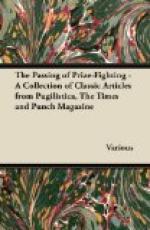At length the curtain slowly rose, and we discovered the author of “Martinuzzi” elevated on a pedestal formed of the cask used by the celebrated German tub-runner (a delicate compliment, by the way, to the genius of the poet). On this appropriate foundation stood the great man, with his august head enveloped in a capacious bread-bag. At a given signal, a vast quantity of crackers were let off, the envious bag was withdrawn, and the illustrious dramatist was revealed to the enraptured spectators, in the statuesque resemblance of his elder, but not more celebrated brother, WILLIAM SHAKSPERE. At this moment the plaudits were vigorously enthusiastic. Thrice did the flattered statue bow its head, and once it laid its hand upon its grateful bosom, in acknowledgment of the honour that was paid it. As soon as the applause had partially subsided, the manager, in the character of Midas, surrounded by the nine Muses, advanced to the foot of the pedestal, and, to use the language of the reporters of public dinners, “in a neat and appropriate speech,” deposed a laurel crown upon the brows of Shakspere’s effigy. Thereupon loud cheers rent the air, and the statue, deeply affected, extended its right hand gracefully towards the audience. In a moment the thunders of applause sank into hushed and listening awe, while the author of the “magnificent poem” addressed the house as follows:—
“My friends,—You at length behold me in the position to which my immense talents have raised me, in despite of ’those laws which press so fatally on dramatic genius,’ and blight the budding hopes of aspiring authors.”
This commencement softened the hearts of his auditors, who clapped their handkerchiefs to their noses.
“The world,” continued the statue, “may regard me with envy; but I despise the world, particularly the critics who have dared to laugh at me. (Groans.) The object of my ambition is attained—I am now the equal and representative of Shakspere—detraction cannot wither the laurels that shadow my brows—Finis coronat opus!—I have done. To-morrow I retire into private life; but though fortune has made me great, she has not made me proud, and I shall be always happy to shake hands with a friend when I meet him.”
At the conclusion of this pathetic address, loud cheers, mingled with tears and sighs, arose from the audience, one-half of whom sunk into the arms of the other half, and were borne out of the house in a fainting state; and thus terminated this imposing ceremony, which will be long remembered with delight by every lover of
[Illustration: THE HIGHER WALK OF THE DRAMA.]
* * * * *
A CARD.
TO THE COMMITTEE OF THE DRAMATIC AUTHORS, ENGLISH OPERA HOUSE.
Mr. Levy, of Holywell-street, perceiving that his neighbour JACOB FAITHFUL’S farce, entitled “The Cloak and Bonnet,” has not given general satisfaction, begs respectfully to offer to the notice of the committee, his large and carefully-assorted stock of second-hand wearing apparel, from which he will undertake to supply any number of dramas that may be required, at a moment’s notice.




